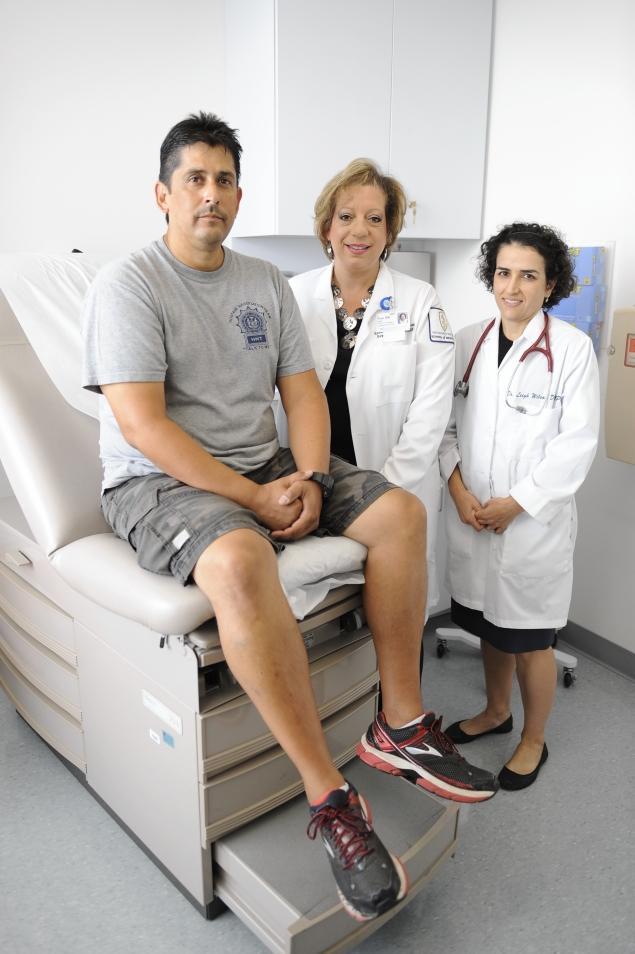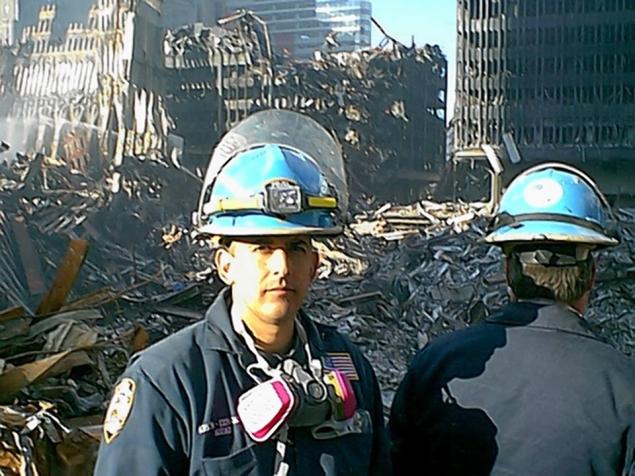By Heidi Evans New York Daily News

NYPD Detective Amadeo Pulley, left, was among the first World Trade Center responders to get cancer as a result to exposure to toxins at Ground Zero in 2001. Practice Nurse Navigator Tina Engel and Dr. Leigh Wilson are pictured with him at the North Shore Hospital /LIJ WTC Health Center in Queens, N.Y. Julia Xanthos/New York Daily News
The “C” word has been every World Trade Center responder’s nightmare — and for good reason.
Cancer has become a reality for more than 1,000 men and women who sacrificed their health at Ground Zero — and the number is expected to grow. “You get a lump in your throat when you first have to tell your wife,” said NYPD Detective Amadeo Pulley, 47, who was diagnosed with kidney cancer in May. “But I told my family and two kids I’m gonna be fine. We will get through this.”
As New York and the nation approach the 12th anniversary of the terrorist attack, a Mount Sinai Medical Center study found a 15% higher cancer rate among 9/11 responders than among people not exposed to the Ground Zero toxins.
As of August, 1,140 responders and people who worked, lived or studied in lower Manhattan have been certified by the National Institute for Occupational Safety and Health to have a WTC-related cancer.

In this photo, taken a few weeks after 9/11, NYPD Detective Amadeo Pulley is shown working as a member of an arson and explosive squad. Amadeo Pulley
Experts believe that is just the tip of the iceberg.
“There are more cases out there, because we just know of the people in our government-funded medical programs, not those who have been treated by their private doctors,” said Dr. Jim Melius, who is chairman of the steering committee for the WTC Responder Medical Program and a 9/11 Health Watch board member.
“Because of the carcinogens in the air at Ground Zero, people who were exposed are vulnerable. And with cancer, there is a delay.”
Tina Engel, an oncology nurse at North Shore Hospital’s WTC clinic in Queens, said: “Sadly enough, I am here just two months, and I have identified a dozen new cancer cases, and I have another 25 patients whose diagnostic test results are pending.
“The good news is that with the new [Zadroga] federal funding, I get what I need when I need it for our patients. Their biopsies and scans are turned around in a week. Cancer trumps everything.”
Like the majority of the WTC responders, engineer Marty Cervellione of the city’s Design and Construction Department developed respiratory and gastric reflux in the early years after the attack.
He spent September 14-Nov. 15, 2001, at Ground Zero, while the fires burned and toxic smoke hovered over everyone.
A more ominous symptom — internal bleeding — led to the devastating diagnosis of gastroesophageal cancer in 2011. Cervellione, 63, has since been through several rounds of chemotherapy.
He thought he was in the clear, but a new spot was discovered this spring. Surgeons at Stony Brook University Hospital removed his right adrenal gland and a piece of his liver in May. He has another month of chemo to go.
“It was always in the back of everyone’s mind we were in jeopardy given the contamination down there, but the entire world was calling on you, it felt so good to serve, there was no wanting to escape,” said the Long Island father of three.
As for Detective Pulley, Dr. Jonathan Coleman at Memorial Sloan-Kettering Cancer Center successfully removed more than half his left kidney July 25. His prognosis is good — he was told he has only a 5% chance of recurrence — and he was spared going through chemo or radiation.
“I think about the guys who passed away and I am fortunate,” said Pulley, who spent 50 days at Ground Zero as part of the arson and explosion squad. “Yeah, I have kidney cancer, but I am still here with my family. If God forbid we were ever attacked again, I would still do the same thing.”
As many as 65,000 people, including first responders, who got sick from 9/11 exposure are part of a WTC medical monitoring and treatment program in the New York metro area and in clinics around the country. To enroll or find out if you are eligible for free medical and mental health care, call 888-982-4748 or visit www.cdc.gov/wtc

